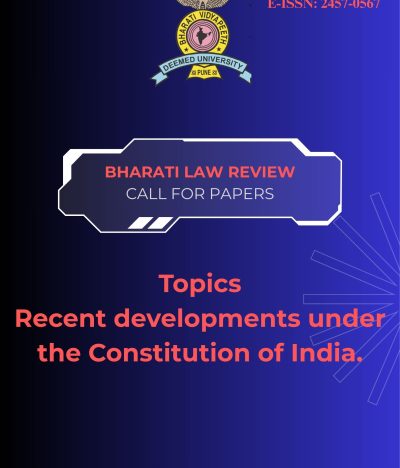Dr. Jaykumar Bhongale
Assistant Professor & Research Coordinator; Bharati Vidyapeeth Deemed to be University, New Law College, Pune.
Dr. Jayashree Khandare
Assistant Professor & Research Coordinator; Bharati Vidyapeeth Deemed to be University, New Law College, Pune.
Abstract:
During the last five thousand years, man has created many Gods. People wasted their time and money to please their Gods. They believe that pleasing God would bless them, and satisfy their wish and dreams, but God did nothing for them. In exchange for their worship, people face many social evil and diseases due to the dread of gods. These people are mentally enslaved by their priests. It may permissible for the ancient people, nomadic people out of their ignorance, they lived in darkness but today there is the light of science moves around the modern people, by virtue of science modern man is aware of each and every hidden mystery of nature, by virtue of science modern people need not worry about an unseen feature of demigod or unseen god. Modern man is seldom faced with mystery, misery, and helplessness. The ancestor of mankind had enough reason to imagine and worship the much more divine supremacy but the present generation has none. The concept of God may have to be lost its relevance today, because of literacy rate of the masses has been increased, and modern discoveries showed the exact truth of many hidden secrets which were prevalent in ancient society. In the Present article, the researcher will point out the various reasons for the existence of God in the human mind even in the modern world where man believes in scientific answers to his problems. The researcher will try to point out the scientific and psychological reasons for the human mind converted into continued adherence to the reverence of God and religion. The researcher also makes some qualitative research through interviews and questionnaire responses got from the various respondents.
1. Introduction
None has proved the existence of God; none has submitted any evidence for the existence of God. God is non-compatible with the developments of science and technology still god has been reverenced by the people. Reverence of God is definitely a personal issue of the individuals and the right to worship may consider a fundamental right like the right to religion available under Articles 25 to 28 of the Indian Constitution. This right to religion is available to all individuals situated around the world. The concern is not declining, demolishing, or criticizing the available right but the concern is about finding out the reason and motivation for the existence of God.
Today, devotees of almost all religions believe in modern science e.g. today Hindus have discarded a major section of the Vedas that describes magic and sacrifices to cure diseases. Modern Hindu priests did not chant hymns to heal patients, instead, they follow modern medicine. At the same time, Hindus continue to chant flattering hymns for gods from the same book. The same thing is applicable to the Christian and Jews, they do not follow remedies available in Bible, but they still worship the Bible. Uttering the hymns or teaching of the Bible does not cure the disease then how the bible or Vedas is being chanted or revered. Today all devotees believe in modern medicine but
continue to revere their perceived gods. Why here doctrine of ‘severability’ is being applied as like being applied under Constitutional principles. According to this doctrine if any statute violates the basic core principle of the Constitutional Law then that statute would be declared as an ultra-virus to Constitution. It will be struck down by the Courts if it is challenged before the court. But this doctrine would be applicable where any part of the statute violates the principles of the Constitution then the whole statute would not be declared as a bad or ultra-virus but only that violating part if possible to remove, possible to remove means if after removing that violating part, the statute would remain active, independent and meaning of Statute would not be changed, from entire Statute.
There are some major reasons behind this fallacy of God and religion in this scientific time. There are four important pillars of the religion today: Theory of Sins, Illiteracy, Poverty, Ancient Literature.
2. Modern Priest
Without these pillars, it is not possible for religion to sustain itself in the modern era. The reasons in the modern era connected with the nature of man modern era have expanded, like the increasing ambition, coupled with their expectations of miracles and the limitation of science have helped to sustain the concept of God. People need a benevolent protector who actually fulfils their interests, expectation, and dreams. Man requires some saviour or patron protective figure, not necessarily actual or physical existence, imaginative or psychological protector is sufficient for harmed man. Without this support man’s life is difficult, difficult to live, he wants to post responsibility for his misdeed or good work to someone else and that someone else will be always feasible. Any corner of the world whether it will in deep in the ocean or deep in the sky, whether in a spar-like dungeon or stroll in a forest. Many people get depressed without the support of some almighty power. The human desire for solace and comfort has led to the persistence of the most cherished illusion of mankind.
3. Theory of Sins
The foundation of the religion builds on the theory of sins, it means man’s good deed and a bad deed will decide the pain and pleasure of an individual’s life. What are the sins- it is the violation of God’s rules, and what is the god’s rules- the rules prescribed and developed under the religion, it includes the religious book, and its interpretations, rituals, rites, and most important the blessing of the priest. The priest is available to each and every religion through him only the door of heaven opened for the common people.
The true attraction of religion lies in its absolution or mercy. The sinner will be saved from the displeasure of life if he follows the true path of the god and the true path is the sole property right of the religion. Another path to diminishing the sin of the sinner is not permissible, unless and until the sinner will not chooses the right path propounded by religion he will not be free from transgression. This theory is the essence of all religions around the world and without this theory, religion would be a cadaver.
How this theory has been developed by man? Or did God himself come down to earth from heaven to tell the exact sense of ethics and morals? Even though sin and a good deed are deeply attached to ethics and morality still they are responsible to create this theory. Before the invention of agriculture condition of nomadic man was in the persecution stage, he could have easily become the prey of wild animals; he was subjected to hunger, wild animal, and weather. But the beginning of agriculture and socialization led to epidemic diseases, famines, poverty, exploitation, injustice,
and crimes. Poverty led to poor hygiene, lack of adequate shelter, and food created ways for diseases and death. So the suffering of the individuals raised the question of their gods because the priest had maintained that God was a philanthropic entity and the well-being of the people was his prime concern. The human suffering laid the top of the question if some almighty and kind power had deliberately made the living being, why did he make the evils? The same kind of questions are available today if god is so kind then why did the rape-like incident happen to the innocent minor girls without their fault? Why do innocent people have to suffer and mighty people enjoy the fruits flourished by the feeble? To establish the concept of a kind and almighty god priests have to discover the cause of the evils. So priests evolved the concept that because of the sinners they are going to face these kinds of miseries. The dilemma of evil had always been a nightmare for all priests of all religions. So to maintain law and order with the help of the king made the social code of conduct was declared the rule of God or the divine word. But again the question put forward that how an innocent baby can become a sinner? How do the weak people without fault become sinners?
4. Illiteracy and Poverty
Illiteracy and poverty are also prime causes for the reverence of God. If you are weak or poor then lack of literacy is the root cause of your position. More you poor more you believe in the existence of God, because the god may provide you relief to sustain and to forget your pain and suffering. Not only individuals but also the whole society is inclined to provide solutions in the name of God to that suppressed individual. It is and was, the willingness of god to create a person to be poor and wear. Such kinds of averments prevailed and circulated in the society so, ultimately he tends to believe in the same premises which are available in the society and he hardly dared to challenge these premises because of a lack of real knowledge and education.
5. Ancient Literature
Almost all the religions and their text were created in the name of God without any scientific investigation. The Vedas, Bible, Kuran, and all available religious books and literature promote the existence of God. According to all religious books, god is the ultimate, Ubiquitous but to prove this they did not provide any kind of evidence. And finally, it is mentioned that it is the belief of individuals who prove the existence and non-existence of God.
6. Reasons To Believe And Not To Believe In God
Believe that God has created the entire universe, all the reality of life, all human affairs controlled, and human morality supported and created by God.1 It is not because it is mentioned in Dharmashatra or religious books, but where humans did not find an answer to the universe will connect with the concept of God.
The people who followed their own intuition in decision-making are not likely to believe in god.2 It is said that the more intelligent people are less likely to believe in God; because intelligent people are not dependent psychologically on the religious benefits. Intelligent people do not like to involve in religious bondage, so they feel more comfortable without the rituals of religion. These kinds of people try to find the answer out of the preview of religion. More religionists are more conformist toward the god. It is been researched that people have a strong desire for self-enhancement, a positive approach towards life to achieve something great in life more persuaded towards the
1 Brett Mercier, Stephanie R. Kramer and Azim F. Shariff, “Belief in God: Why People Believe, and Why They Don’t,” 27
Current Directions in Psychological Science 263–8 (2018).
2 Ibid.
religion and god. It is also being said that lonely people are less conversant about the belief in god but another research conducted by (Epiley, and Cacioppo, 2008) mentioned that more loneliness in life created more inclined toward the religion and god. The existence of a deity who is simultaneously omnipotent and omnibenevolent is disputed by the problem of evil, which claims that such a god should not allow evil or suffering to exist.3
7. Religious Psychological Prerequisites
Theory of Mind (TOM), the awareness that others’ ideas, wants, and objectives influence people’s behaviour. TOM enables complex social interactions and behaviour prediction in other people. Without it, you couldn’t “place yourself in someone else’s shoes.” We are predisposed to accept religious habits because of our propensity to over-imitate. Humans acquire the majority of their actions and abilities from other people rather than via experience and trial and error. It is hard to solve problems on our own since the cultural knowledge that has been acquired over many generations is essential to our success. Additionally, some of this information runs counter to what you may infer based on your own observations or instincts. For instance, several civilizations have created strategies for preparing dangerous herbs (like Aboriginal Australians processing poisonous seeds of cycad plants). They have transmitted these ritualised practises without necessarily recognising the necessity of the challenging, drawn-out processes. But omitting what can seem like superfluous measures would harm you over time. Thus, imitating others can be advantageous for survival even when the motivations are hidden. If eminent people of your community slaughtered deer every solstice, you definitely would too. This mindset is transferred to religious traditions.
The development of religions in human civilizations is probably a result of brain traits that have evolved over time, such as Theory of Mind and over-imitation. Natural evolutionary processes alone can explain why so many people believe in supernatural creatures.
8. Religion and God
Religion and god are seemed to be connected in the usual fashion of understanding the people. Whether god has come first or religion? It is a similar question to whether the hen arrives first or the egg. The common belief among the society is that in-between man and god the religion has only performed the role of mediator, and conciliator. It also has the belief that religion is purely a personal matter between man and God. So, society has no role in interfering in the matter of individuals and every individual may be free to designate the faith and revere the god. Some researchers also argue also that if society has no role to interfere in the matter of worship of God then how religion is allowed to interfere in it? Another view is also important that to understand the function and purposes of religion it is necessary to separate religion from theology.4 According to Dr. B.R. Ambedkar that the primary things in the religion were involved the usages, practices, and observances, rites and rituals and theology was secondary.5 So, according to this premise, the primary purpose of religion was social. In the primitive society, religion was a medium relegated to life and preservation of life and it is these life processes that constitute the substance and source of the religion.
In today’s society, God and religion are interdependent on each other, without religion there will be any reverence for the gods, and god worship is only possible through the entire jurisdiction of religion. In the present era between man and god not only the religion but one more mediator
3 “Existence of God Definition, Arguments, & Facts Britannica,”available at: https://www.britannica.com/topic/existence-of- God (last visited November 12, 2022).
4 Valerian Rodrigues, The Essential Writings of Dr. B. R. Ambedkar (Oxford University Press, 2002).
5 Ibid.
arrives and that is the modern priest. Without a modern priest, your worship of the god could not succeed even though you lived in a remote place in the country. He is available everywhere and in every religion. Without religion, there will not be god and without god, there is not any religion. Today god has the taken place of magic, superstition, and miracle. Without miracle and magic god will not be believed, he can do anything and everything.
· Origin of Religion
Everything which affect them became a part of their religion. The ceremonies of the savage society were not only concerned with the events of birth, attaining manhood, puberty, marriage, sickness, death, and war but were also concerned with food. Among the pastoral people, the flocks and herds were sacred; among the agricultural peoples, seedtime and harvest are marked by ceremonies performed with some reference to the growth and preservation of the crops. Likewise drought, pestilence, and other strange irregular phenomena of nature occasion the performance of ceremonial. The life and preservation of life consist of the religion of the savage. What is true of the religion of the savage is true of all religions whenever they are found for the simple reason that constitutes the essence of religion. In a present-day society with its theological refinements, this essence of religion has become concealed from view and is even forgotten. But the life and preservation of life constitute the essence of religion even in the present-day society is beyond question. This was explained by Professor Crawley in these words,
“Man’s religion does not enter into his professional or social hours, his scientific or artistic moments; practically its chief claims are settled on one day in the week from which ordinary worldly concerns are excluded. In fact, his life is in two parts; but the moiety with which religion is concerned is elemental. Serious thinking on the ultimate questions of life and death is, roughly speaking, the essence of his Sabbath; add to this is the habit of prayer, the giving of thanks at meals, and the subconscious feeling that birth and death, continuation and marriage are rightly solemnized by religion, while business and pleasure may possibly be consecrated, but only metaphorically or by the overflow of religious feeling.”
9. The Development of The God-Believing Brain In Humans
The desire to believe in the paranormal is innate. Consider that 84 percent of the world’s population, or close to 6 billion people, identify as religious, and that number is predicted to increase over the next several decades. 90 percent of adults in the United States, according to studies, believe in a higher power, spiritual force, or God. Atheists universally reject God, according to the same research, yet one in five acknowledge spiritual or higher powers.
Image 1.1 6
6 Benjamin Wormald, “The Future of World Religions: Population Growth Projections, 2010-2050” Pew Research Center’s Religion & Public Life Project, 2015 available at: https://www.pewresearch.org/religion/2015/04/02/religious-projections-2010-2050/ (last visited April 3, 2023).
In a nutshell, people tend to believe. This, according to evolutionary anthropologists, is no miracle. Evolutionary theory may be used to explain the beginnings and widespread nature of religious beliefs.
10. Conclusion:
In recent trends in world where people don’t believe in God available under bible, Geeta or Kuran, but they believe in some other higher power or spiritual force of the Universe, and this number is increasing day by day. But this change happening only in countryside only where all facilities of education, freedom and liberty of thought and great livelihood available to the general people and other side where world facing from hunger, education, freedom and consistent persistent of subjugation available where more inclination and more constant adoption of primitive thought of firm believer of God.
After examining various perspectives on the question of why God has not evaporated, it is clear that the belief in God continues to hold significance for many people around the world. While the influence of religion may be waning in some societies, the search for spirituality and a higher power remains a fundamental aspect of human existence. Whether through traditional religious practices or alternative forms of spirituality, individuals continue to find meaning, purpose, and comfort in their connection to the divine. Ultimately, the persistence of belief in God suggests that, despite the challenges and uncertainties of the modern world, the human need for transcendence and a sense of meaning and purpose remains as strong as ever. The political system is briefly responsible to have more faith on God among the people, because religious people don’t revolt against the present system that may be political, economic. So, it is better to have people concentrated on worship of the God rather than criticising the government policies and rule.
References:
- Dawkins, R. (2006). The God Delusion. Boston, MA: Houghton Mifflin Company.
- Harris, S. (2005). The End of Faith: Religion, Terror, and the Future of Reason. New York, NY: W.W. Norton & Company.
- Hitchens, C. (2007). God is Not Great: How Religion Poisons Everything. New York, NY: Twelve.
- Dennett, D.C. (2006). Breaking the Spell: Religion as a Natural Phenomenon. New York, NY: Penguin Books.
McGrath, A.E. (2004). The Twilight of Atheism: The Rise and Fall of Disbelief in the Modern World. New York, NY: Doubleday.
- Plantinga, A. (2000). Warranted Christian Belief. New York, NY: Oxford University Press.
- Swinburne, R. (2004). The Existence of God. New York, NY: Oxford University Press.
- Craig, W.L. (2008). Reasonable Faith: Christian Truth and Apologetics. Wheaton, IL: Crossway.
- Moreland, J.P., & Craig, W.L. (2003). Philosophical Foundations for a Christian Worldview. Downers Grove, IL: IVP Academic.
- Collins, F.S. (2006). The Language of God: A Scientist Presents Evidence for Belief. New York, NY: Free Press.





